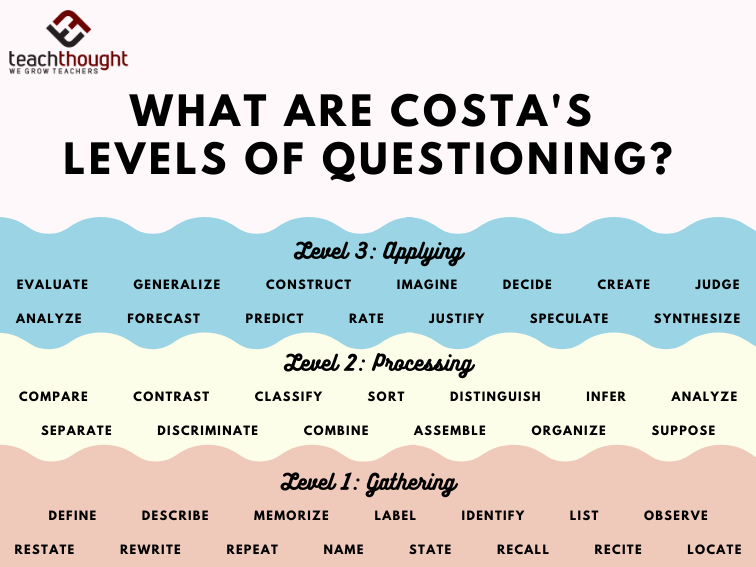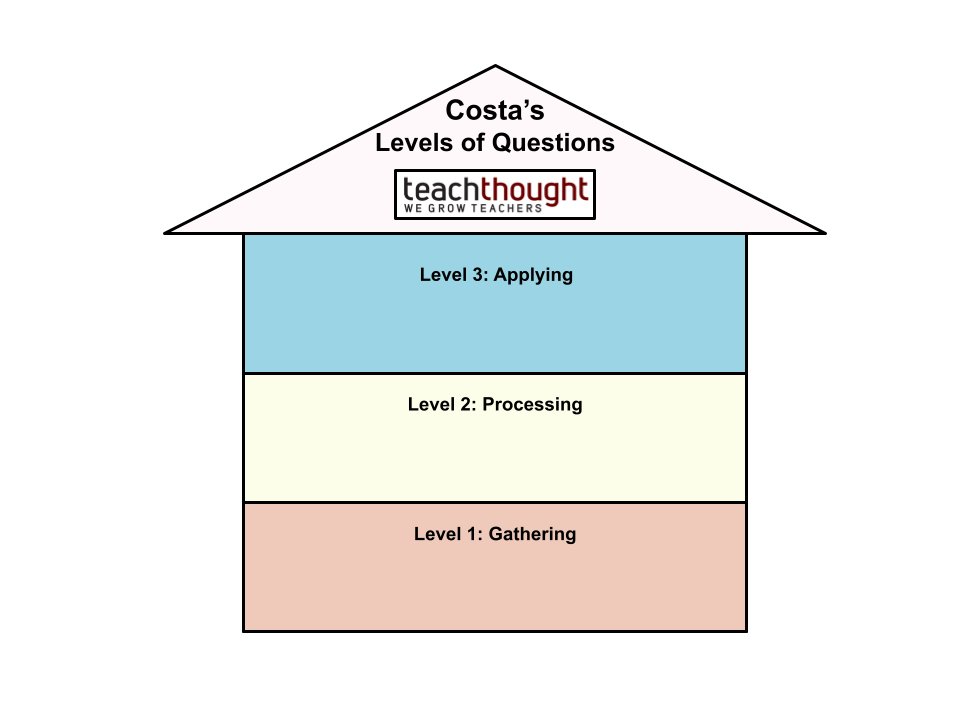

Costa’s Degrees of Examining– developed by academic scientist Art Costa– include three rates of questioning developed to advertise higher-level thinking and query.
Comparable to Blossom’s taxonomy , Costa’s lower level triggers pupils to utilize even more standard professors; as trainees move up in levels, the inquiries motivate them to use even more complicated reasoning skills. With years of study on human strength, Dr. Costa additionally identified the 16 Behaviors of Mind , a set of actions that sustain trainees in navigating the challenges that usually occur in institution and life, generally. Several of Dr. Costa’s 16 practices– thinking interdependently, introducing, collecting data, and using previous expertise to new scenarios– both require and enhance greater degrees of wondering about.
There is a substantive amount of study that supports Dr. Costa’s schema. Newmann (1993 located that higher-order assuming compels pupils to “adjust info and concepts in ways that transform their meaning,” and “expects pupils to address problems and establish suggesting for themselves,” which straightens with a constructivist sight of education and learning
Costa’s Degrees of Examining are usually illustrated making use of the metaphor of a house with three floors:


Degree 1: Collecting
Degree 1 concerns mostly call for pupils to work with information ‘on the web page.’ Answers to level 1 concerns are usually literal; definition, a trainee can literally point to the answer on a web page.
We’ve formerly blogged about Flower’s Taxonomy power verbs , so you can forecast that Costa’s degrees have their own set of power verbs, also. Right here are a couple of that you could locate at the start of Level 1 concerns:
- Specify
- Explain
- Memorize
- Label
- Determine
- Checklist
- Observe
- Reiterate
- Rewrite
- Repeat
- Call
- State
- Remember
- Recite
- Situate
- Select
- Suit
- Program
Level 1 inquiries by content area could look like these examples:
- Scientific research : Label the parts of a pet cell.
- Math : Recite the formula for discovering the volume of a cyndrical tube.
- Social Studies : Match the name of the emperor to their particular nation.
- English Language Arts : Situate the area in the plot where the orgasm takes place.
You can see exactly how the majority of these Level 1 power verbs call for pupils to remember details, which is an important skill in its very own right. However, instructors ought to pursue the majority of their concerns to fall in Level 2 or 3, which test trainees to use higher-order reasoning abilities.
Degree 2: Handling
Degree 2 inquiries go a step additionally than Degree 1, motivating pupils to process details by ‘analysis between the lines.’ While trainees may require to use actual details to develop their actions, Degree 2 requires them to process that information with what they currently know in order to make brand-new links.
Below are some instances of Degree 2 power verbs:
- Compare
- Contrast
- Identify
- Sort
- Distinguish
- Infer
- Analyze
- Different
- Discriminate
- Incorporate
- Set up
- Arrange
- Mean
Degree 2 concerns by content area may show up in the adhering to methods:
- Science : Compare the procedures of mitosis and meiosis.
- Math : Identify the geometric forms according to their number of sides and angles.
- Social Studies : Put together the following historical occasions in the order of importance, from most to least.
- English Language Arts : Analy ze the impact that the writer’s tone carries the total definition of the text.
Can you see exactly how Degree 2 concerns go an action even more than Degree 1 More than merely regurgitating info, students take it and ‘do something’ with it. They categorize, make differences, and compare/contrast it against another part to see just how it impacts the entire. These sort of skills can stimulate interest and build a bridge to the questions that truly create creative thinking and higher-level thinking.
Degree 3: Using
While Degree 1 questions motivate students to deal with input, and Degree 2 concerns test them to refine that input in order to make new connections. Here, students take part in the highest-level thinking abilities to develop an output. This might result from making assessments and evaluations, screening solutions to different issues, or making predictions.
We’ve included some examples of Degree 3 power verbs listed below:
- Assess
- Generalize
- Create
- Picture
- Decide
- Produce
- Judge
- Evaluate
- Projection
- If/then
- Predict
- Rate
- Justify
- Guess
- Synthesize
- Construct
- Assume
Level 3 inquiries by material location may appear like the following:
- Science : Based upon information from the last years of cyclone task in the southeast U.S., anticipate exactly how the regularity of typhoon task will alter in the next ten years.
- Mathematics : Rate the likelihood of a presidential prospect winning the election based upon protecting the electoral ballots from the following U.S. states: Florida, The Golden State, Virginia, New York City, Illinois.
- History : Develop a social compact that takes into consideration the results of globalization and technical improvement in the 21 st century.
- English Language Arts : Construct a disagreement that defends or shoots down required worker vaccination plans in the USA.
Whether preparing for discussion-based activities, project-based understanding, or independent questions, teachers should strive to orient the majority of pupil reasoning and interaction at Degrees 2 and 3 Evaluations that motivate pupils to recall fundamental truths (such as the date of a historic event, or the name of an author, or the formula for an equation) do not truly evaluate pupils’ capability to apply new abilities or details to brand-new contexts. A Degree 2 or 3 concern would test students to make connections with standard information. For example, rather than remembering a plain date, a much more flexible concern would ask trainees to forecast, based on the time in history that a certain event happened, the probability of it persisting, given a similar sociopolitical environment. Along the very same lines, rather than recalling the names of popular authors, a teacher could challenge students to make a debate for how an author would certainly discuss a particular modern-day problem.
In “A Speak with Teachers,” James Baldwin explained the mystery of education and learning: “As one starts to become mindful, one begins to examine the society in which [they] are educated.” Level 2 (and mainly, level 3 concerns intend to promote this sort of response in students, to trigger them to turn their heads, do double-takes, point out inconsistencies, interrupt the status, identify flaws in present establishments, and develop cutting-edge options for those defects. These are the inquiries that influence us to come up with more concerns, to think about our thinking, and to evolve– both as people and societies.